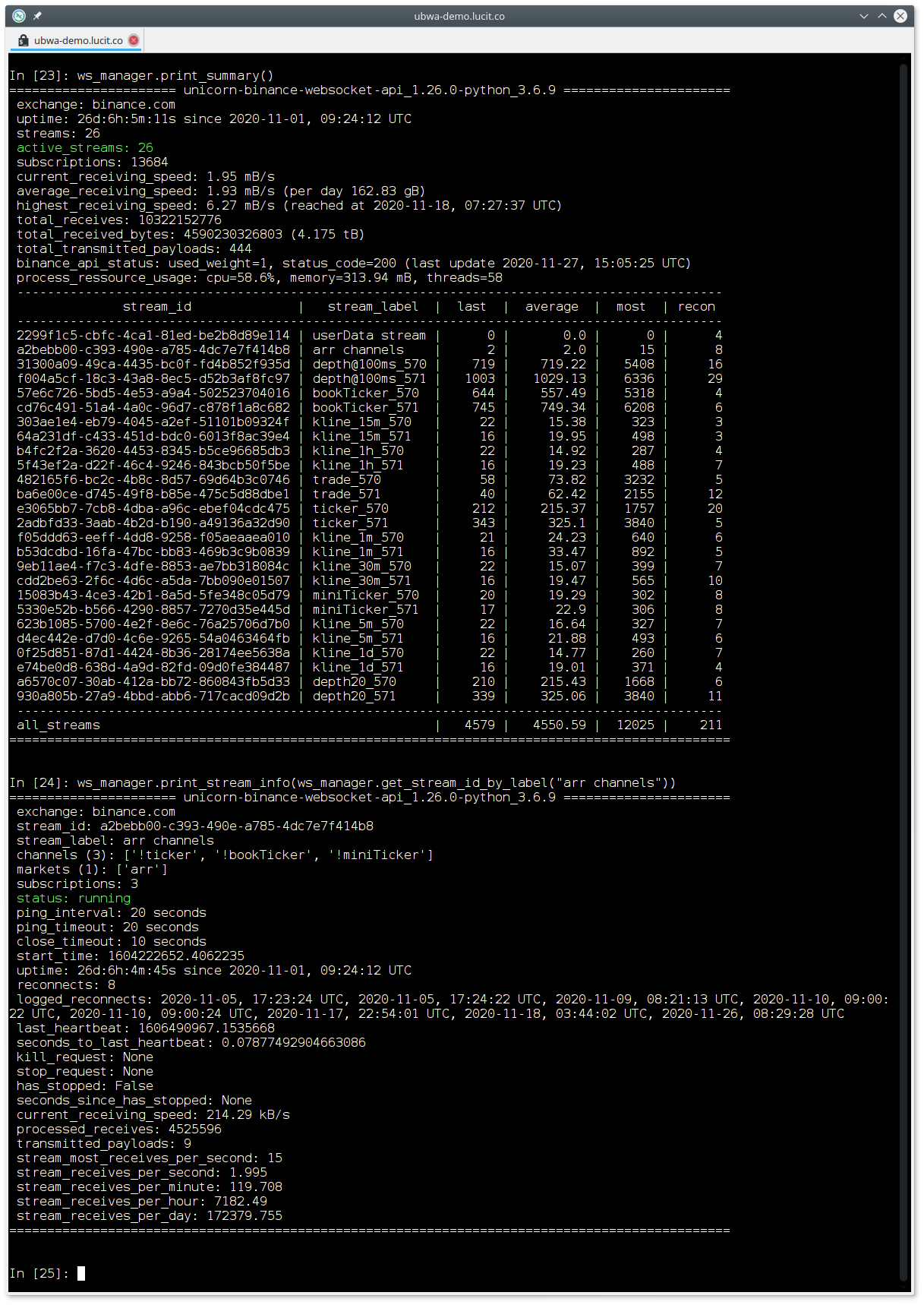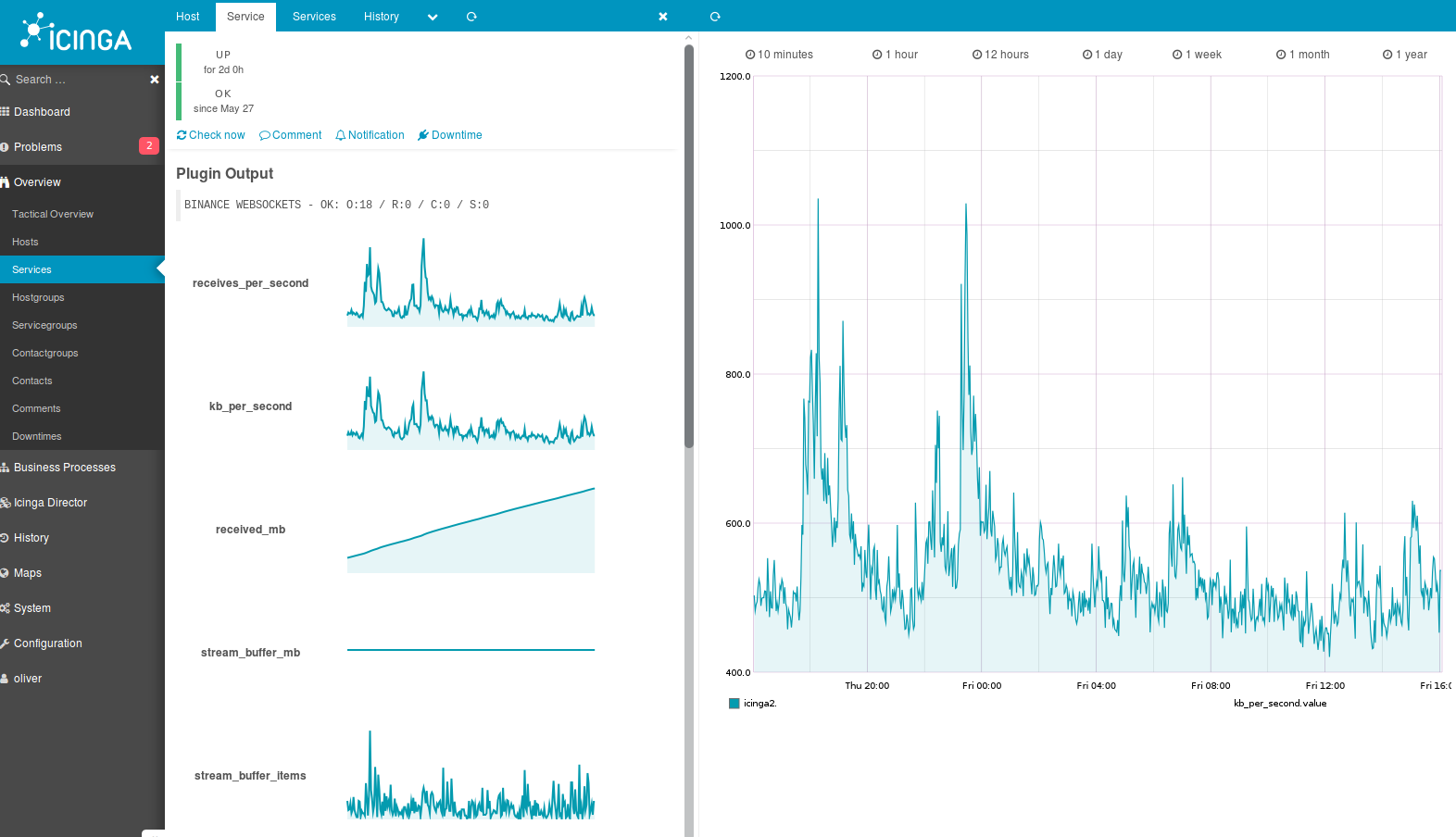UNICORN Binance WebSocket API¶
Description | Live Demo | Installation | How To | Documentation | Examples | Change Log | Wiki | Social | Notifications | Bugs | Contributing | Disclaimer | Commercial Support
A Python SDK by LUCIT to use the Binance Websocket API`s (com+testnet, com-margin+testnet, com-isolated_margin+testnet, com-futures+testnet, com-coin_futures, us, tr, dex/chain+testnet) in a simple, fast, flexible, robust and fully-featured way.
Part of ‘UNICORN Binance Suite’.
Get help with the integration of the UNICORN Binance Suite modules!
Get a UNICORN Binance Suite License¶
To run modules of the UNICORN Binance Suite you need a valid license!
Receive Data from Binance WebSockets¶
Create a multiplex websocket connection to Binance with a stream_buffer with just 3 lines of code¶
from unicorn_binance_websocket_api import BinanceWebSocketApiManager
ubwa = BinanceWebSocketApiManager(exchange="binance.com")
ubwa.create_stream(channels=['trade', 'kline_1m'], markets=['btcusdt', 'bnbbtc', 'ethbtc'])
And 4 more lines to print out the data¶
while True:
oldest_data_from_stream_buffer = ubwa.pop_stream_data_from_stream_buffer()
if oldest_data_from_stream_buffer:
print(oldest_data_from_stream_buffer)
Or with a callback function just do¶
from unicorn_binance_websocket_api import BinanceWebSocketApiManager
def process_new_receives(stream_data):
print(str(stream_data))
ubwa = BinanceWebSocketApiManager(exchange="binance.com")
ubwa.create_stream(channels=['trade', 'kline_1m'],
markets=['btcusdt', 'bnbbtc', 'ethbtc'],
process_stream_data=process_new_receives)
Or with an async callback function just do¶
from unicorn_binance_websocket_api import BinanceWebSocketApiManager
import asyncio
async def process_new_receives(stream_data):
print(stream_data)
await asyncio.sleep(1)
ubwa = BinanceWebSocketApiManager()
ubwa.create_stream(channels=['trade', 'kline_1m'],
markets=['btcusdt', 'bnbbtc', 'ethbtc'],
process_stream_data_async=process_new_receives)
Or await the stream data in an asyncio coroutine¶
All the methods of data collection presented have their own advantages and disadvantages. However, this is the generally recommended method for processing data from streams.
from unicorn_binance_websocket_api import BinanceWebSocketApiManager
import asyncio
async def main():
async def process_asyncio_queue(stream_id=None):
print(f"Start processing the data from stream '{ubwa.get_stream_label(stream_id)}':")
while ubwa.is_stop_request(stream_id) is False:
data = await ubwa.get_stream_data_from_asyncio_queue(stream_id)
print(data)
ubwa.asyncio_queue_task_done(stream_id)
ubwa.create_stream(channels=['trade'],
markets=['ethbtc', 'btcusdt'],
stream_label="TRADES",
process_asyncio_queue=process_asyncio_queue)
while not ubwa.is_manager_stopping():
await asyncio.sleep(1)
with BinanceWebSocketApiManager(exchange='binance.com') as ubwa:
try:
asyncio.run(main())
except KeyboardInterrupt:
print("\r\nGracefully stopping ...")
except Exception as e:
print(f"\r\nERROR: {e}\r\nGracefully stopping ...")
Basically that’s it, but there are more options.
Convert received stream data into well-formed Python dictionaries with UnicornFy¶
unicorn_fied_stream_data = UnicornFy.binance_com_websocket(data)
or
ubwa.create_stream(['trade'], ['btcusdt'], output="UnicornFy")
Subscribe / unsubscribe new markets and channels¶
markets = ['engbtc', 'zileth']
channels = ['kline_5m', 'kline_15m', 'kline_30m', 'kline_1h', 'kline_12h', 'depth5']
ubwa.subscribe_to_stream(stream_id=stream_id, channels=channels, markets=markets)
ubwa.unsubscribe_from_stream(stream_id=stream_id, markets=markets)
ubwa.unsubscribe_from_stream(stream_id=stream_id, channels=channels)
Send Requests to Binance WebSocket API¶
Place orders, cancel orders or send other requests via WebSocket¶
from unicorn_binance_websocket_api import BinanceWebSocketApiManager
api_key = "YOUR_BINANCE_API_KEY"
api_secret = "YOUR_BINANCE_API_SECRET"
async def process_api_responses(stream_id=None):
while ubwa.is_stop_request(stream_id=stream_id) is False:
data = await ubwa.get_stream_data_from_asyncio_queue(stream_id=stream_id)
print(data)
ubwa.asyncio_queue_task_done(stream_id=stream_id)
ubwa = BinanceWebSocketApiManager(exchange="binance.com")
api_stream = ubwa.create_stream(api=True,
api_key=api_key,
api_secret=api_secret,
output="UnicornFy",
process_asyncio_queue=process_api_responses)
response = ubwa.api.spot.get_server_time(return_response=True)
print(f"Binance serverTime: {response['result']['serverTime']}")
orig_client_order_id = ubwa.api.spot.create_order(order_type="LIMIT",
price = 1.1,
quantity = 15.0,
side = "SELL",
symbol = "BUSDUSDT")
ubwa.api.spot.cancel_order(orig_client_order_id=orig_client_order_id, symbol="BUSDUSDT")
All available methods:
Here you can find a complete guide on how to process requests via the Binance WebSocket API!
Stop ubwa after usage to avoid memory leaks¶
When you instantiate UBWA with with, ubwa.stop_manager() is automatically executed upon exiting the with-block.
with BinanceWebSocketApiManager() as ubwa:
ubwa.create_stream(channels="trade", markets="btcusdt", stream_label="TRADES")
Without with, you must explicitly execute ubwa.stop_manager() yourself.
ubwa.stop_manager()
stream_signals - know the state of your streams¶
Usually you want to know when a stream is working and when it is not. This can be useful to know that your own system is currently “blind” and you may want to close open positions to be on the safe side, know that indicators will now provide incorrect values or that you have to reload the missing data via REST as an alternative.
For this purpose, the UNICORN Binance WebSocket API provides so-called
stream_signals,
which are used to tell your code in real time when a stream is connected, when it received its first data record, when
it was disconnected and stopped, and when the stream cannot be restored.
from unicorn_binance_websocket_api import BinanceWebSocketApiManager
import time
def process_stream_signals(signal_type=None, stream_id=None, data_record=None, error_msg=None):
print(f"Received stream_signal for stream '{ubwa.get_stream_label(stream_id=stream_id)}': "
f"{signal_type} - {stream_id} - {data_record} - {error_msg}")
with BinanceWebSocketApiManager(process_stream_signals=process_stream_signals) as ubwa:
ubwa.create_stream(channels="trade", markets="btcusdt", stream_label="TRADES")
print(f"Waiting a few seconds and then stopping the stream ...")
time.sleep(7)
More?¶
Discover even more possibilities, use this script to stream everything from “binance.com” or try our examples!
This should be known by everyone using this lib:
Description¶
The Python package UNICORN Binance WebSocket API provides an API to the Binance Websocket API`s of Binance (+Testnet), Binance Margin (+Testnet), Binance Isolated Margin (+Testnet), Binance Futures (+Testnet), Binance COIN-M Futures, Binance US, Binance TR, Binance DEX and Binance DEX Testnet and supports sending requests to the Binance Websocket API and the streaming of all public streams like trade, kline, ticker, depth, bookTicker, forceOrder, compositeIndex, blockheight etc. and also all private userData streams which needs to be used with a valid api_key and api_secret from the Binance Exchange www.binance.com, testnet.binance.vision or www.binance.us - for the DEX you need a user address from www.binance.org or testnet.binance.org, and you can get funds for the testnet.
Use the UNICORN Binance REST API in combination.
What are the benefits of the UNICORN Binance WebSocket API?¶
Fully managed websockets and 100% auto-reconnect! Also handles maintenance windows!
No memory leaks from Python version 3.8 to 3.12!
The full UBS stack is delivered as a compiled C extension for maximum performance.
Support for Binance Websocket API, send requests like create_order, cancel_open_orders and many more directly over websocket!
| Exchange | Exchange string | WS | WS API |
|---|---|---|---|
| Binance | binance.com |
||
| Binance Testnet | binance.com-testnet |
||
| Binance Margin | binance.com-margin |
||
| Binance Margin Testnet | binance.com-margin-testnet |
||
| Binance Isolated Margin | binance.com-isolated_margin |
||
| Binance Isolated Margin Testnet | binance.com-isolated_margin-testnet |
||
| Binance USD-M Futures | binance.com-futures |
||
| Binance USD-M Futures Testnet | binance.com-futures-testnet |
||
| Binance Coin-M Futures | binance.com-coin_futures |
||
| Binance US | binance.us |
||
| Binance TR | trbinance.com |
||
| Binance DEX | binance.org |
||
| Binance DEX Testnet | binance.org-testnet |
Streams are processing asynchronous/concurrent (Python asyncio) and each stream is started in a separate thread, so you don’t need to deal with asyncio in your code! But you can consume with
await, if you want!Supports subscribe/unsubscribe on all exchanges! (Take a look to the max supported subscriptions per stream in the endpoint configuration overview!)
UNICORN Binance WebSocket API respects Binance’s API guidelines and protects you from avoidable reconnects and bans.
Support for multiple private
!userDatastreams with differentapi_keyandapi_secret. (example_multiple_userdata_streams.py)Pick up the received data from the
stream_buffer(FIFO or LIFO) - if you can not store your data in cause of a temporary technical issue, you can kick back the data to thestream_bufferwhich stores the receives in the RAM till you are able to process the data in the normal way again. Learn more!Use separate
stream_buffersfor specific streams or users!Watch the
stream_signalsto receiveCONNECT,FIRST_RECEIVED_DATA,DISCONNECT,STOPandSTREAM_UNREPAIRABLEsignals from your streams! Learn more!Get the received data unchanged as received, as Python dictionary or converted with UnicornFy into well-formed Python dictionaries. Use the
outputparameter ofcreate_stream()to control the output format.Helpful management features like
clear_asyncio_queue(),clear_stream_buffer(),get_binance_api_status(),get_current_receiving_speed(),get_errors_from_endpoints(),get_limit_of_subscriptions_per_stream(),get_request_id(),get_result_by_request_id(),get_results_from_endpoints(),get_stream_buffer_length(),get_stream_info(),get_stream_list(),get_stream_id_by_label(),get_stream_statistic(),get_stream_subscriptions(),get_version(),is_update_available(),get_stream_data_from_asyncio_queue(),pop_stream_data_from_stream_buffer(),print_summary(),replace_stream(),set_stream_label(),set_ringbuffer_error_max_size(),subscribe_to_stream(),stop_stream(),unsubscribe_from_stream(),wait_till_stream_has_started()and many more! Explore them here.Monitor the status of the created
BinanceWebSocketApiManager()instance within your code withget_monitoring_status_plain()and specific streams withget_stream_info().Available as a package via
pipandcondaas precompiled C extension with stub files for improved Intellisense functions and source code for easier debugging of the source code. To the installation.Nice to use with iPython: “IPython (Interactive Python) is a command shell for interactive computing that offers introspection, rich media, shell syntax, tab completion, and history.” (example_interactive_mode.py)

Also, nice to use with the Jupyter Notebook :)
Monitoring API service and a check_command for ICINGA/Nagios

Integration of test cases and examples.
Customizable base URL.
Socks5 Proxy support:
ubwa = BinanceWebSocketApiManager(exchange="binance.com", socks5_proxy_server="127.0.0.1:9050")
Read the docs or this how to for more information or try example_socks5_proxy.py.
Excessively tested on Linux, Mac and Windows on x86, arm32, arm64, …
If you like the project, please  it on
GitHub!
it on
GitHub!
Live Demo¶
This live demo script is streaming from binance.com and runs on a CCX13 virtual machine of HETZNER CLOUD
(Refresh update once a minute!)
Installation and Upgrade¶
The module requires Python 3.8 and runs smoothly up to and including Python 3.12.
Anaconda packages are available from Python version 3.8 and higher, but only in the latest version!
For the PyPy interpreter we offer packages via PyPi only from Python version 3.9 and higher.
The current dependencies are listed here.
If you run into errors during the installation take a look here.
Packages are created automatically with GitHub Actions¶
When a new release is to be created, we start two GitHubActions:
Both start virtual Windows/Linux/Mac servers provided by GitHub in the cloud with preconfigured environments and create the respective compilations and stub files, pack them into wheels and conda packages and then publish them on GitHub, PYPI and Anaconda. This is a transparent method that makes it possible to trace the source code behind a compilation.
A Cython binary, PyPy or source code based CPython wheel of the latest version with pip from PyPI¶
Our Cython and PyPy Wheels are available on PyPI, these wheels offer significant advantages for Python developers:
Performance Boost with Cython Wheels: Cython is a programming language that supplements Python with static typing and C-level performance. By compiling Python code into C, Cython Wheels can significantly enhance the execution speed of Python code, especially in computationally intensive tasks. This means faster runtimes and more efficient processing for users of our package.
PyPy Wheels for Enhanced Efficiency: PyPy is an alternative Python interpreter known for its speed and efficiency. It uses Just-In-Time (JIT) compilation, which can dramatically improve the performance of Python code. Our PyPy Wheels are tailored for compatibility with PyPy, allowing users to leverage this speed advantage seamlessly.
Both Cython and PyPy Wheels on PyPI make the installation process simpler and more straightforward. They ensure that you get the optimized version of our package with minimal setup, allowing you to focus on development rather than configuration.
On Raspberry Pi and other architectures for which there are no pre-compiled versions, the package can still be installed with PIP. PIP then compiles the package locally on the target system during installation. Please be patient, this may take some time!
Installation¶
pip install unicorn-binance-websocket-api
Update¶
pip install unicorn-binance-websocket-api --upgrade
A Conda Package of the latest version with conda from Anaconda¶
The unicorn-binance-websocket-api package is also available as a Cython version for the linux-64, osx-64
and win-64 architectures with Conda through the
lucit channel.
For optimal compatibility and performance, it is recommended to source the necessary dependencies from the
conda-forge channel.
Installation¶
conda config --add channels conda-forge
conda config --add channels lucit
conda install -c lucit unicorn-binance-websocket-api
Update¶
conda update -c lucit unicorn-binance-websocket-api
From source of the latest release with PIP from GitHub¶
Linux, macOS, …¶
Run in bash:
pip install https://github.com/LUCIT-Systems-and-Development/unicorn-binance-websocket-api/archive/$(curl -s https://api.github.com/repos/LUCIT-Systems-and-Development/unicorn-binance-websocket-api/releases/latest | grep -oP '"tag_name": "\K(.*)(?=")').tar.gz --upgrade
Windows¶
Use the below command with the version (such as 2.9.0) you determined here:
pip install https://github.com/LUCIT-Systems-and-Development/unicorn-binance-websocket-api/archive/2.9.0.tar.gz --upgrade
From the latest source (dev-stage) with PIP from GitHub¶
This is not a release version and can not be considered to be stable!
pip install https://github.com/LUCIT-Systems-and-Development/unicorn-binance-websocket-api/tarball/master --upgrade
Change Log¶
https://unicorn-binance-websocket-api.docs.lucit.tech/changelog.html
Documentation¶
Examples¶
Howto¶
Project Homepage¶
Wiki¶
https://github.com/LUCIT-Systems-and-Development/unicorn-binance-websocket-api/wiki
Receive Notifications¶
To receive notifications on available updates you can
 the repository on GitHub, write your
own script
with using
the repository on GitHub, write your
own script
with using
is_update_available()
or you use the
monitoring API service.
Follow us on LinkedIn, X or Facebook!
To receive news (like inspection windows/maintenance) about the Binance API`s subscribe to their telegram groups:
How to report Bugs or suggest Improvements?¶
List of planned features - click  if you need one of them or suggest a new feature!
if you need one of them or suggest a new feature!
Before you report a bug, try the latest release. If the issue still exists, provide the error trace, OS and Python version and explain how to reproduce the error. A demo script is appreciated.
If you don’t find an issue related to your topic, please open a new issue!
Contributing¶
UNICORN Binance WebSocket API is an open source project which welcomes contributions which can be anything from simple documentation fixes and reporting dead links to new features. To contribute follow this guide.
Contributors¶
We  open source!
open source!
Disclaimer¶
This project is for informational purposes only. You should not construe this information or any other material as legal, tax, investment, financial or other advice. Nothing contained herein constitutes a solicitation, recommendation, endorsement or offer by us or any third party provider to buy or sell any securities or other financial instruments in this or any other jurisdiction in which such solicitation or offer would be unlawful under the securities laws of such jurisdiction.
If you intend to use real money, use it at your own risk!¶
Under no circumstances will we be responsible or liable for any claims, damages, losses, expenses, costs or liabilities of any kind, including but not limited to direct or indirect damages for loss of profits.
SOCKS5 Proxy / Geoblocking¶
We would like to explicitly point out that in our opinion US citizens are exclusively authorized to trade on Binance.US and that this restriction must not be circumvented!
The purpose of supporting a SOCKS5 proxy in the UNICORN Binance Suite and its modules is to allow non-US citizens to use US services. For example, GitHub actions with UBS will not work without a SOCKS5 proxy, as they will inevitably run on servers in the US and be blocked by Binance.com. Moreover, it also seems justified that traders, data scientists and companies from the US analyze binance.com market data - as long as they do not trade there.
Commercial Support¶
Do you need a developer, operator or consultant? Contact us for a non-binding initial consultation!




















Social¶
Discussions
Gitter
https://t.me/unicorndevs
https://dev.binance.vision
https://forum.bnbchain.org/